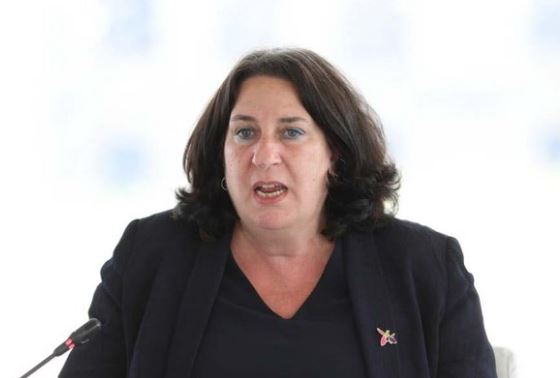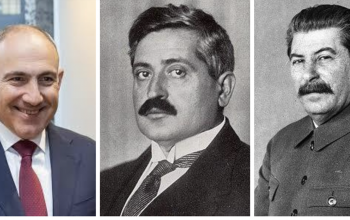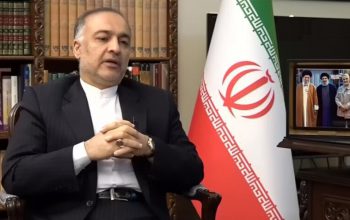By Harut Sassounian,
Publisher, The California Courier
Journalist Till Bruckner wrote a lengthy investigative article regarding Azerbaijan handing some of its vast petrodollars to politicians, businessmen, and universities around the world. Even prominent individuals and institutions prostitute themselves when a huge amount of money is thrown at them. Bruckner’s article, “Corruptistan Azerbaijan: How to Build Yourself a Stealth Lobbyist, Azerbaijani style,” was posted on the website of “Organized Crime and Corruption Reporting Project.”
The article states: “The rise of Brenda Shaffer, a scholar and oft-quoted expert in the field of energy politics illustrates just how vulnerable the American foreign policy establishment is to manipulation by foreign agents. Supported by an overseas regime and an assorted network of overt and undercover lobbyists, she used oil money to build her academic credentials, then in turn used those credentials to promote Azerbaijan’s agendas through Congressional testimony, dozens of newspaper op-eds and media appearances, countless think tank events, and even scholarly publications. She’s still doing it.”
When testifying before the House of Representatives’ Committee on International Relations in 2001, Shaffer was introduced as “the director of the Caspian Studies Program and a post-doctoral fellow in the international security program at the Belfort [Belfer] Center for Science and International Affairs at Harvard’s Kennedy School of Government.”
In her remarks, Shaffer asked Congress to repeal Section 907 of the Freedom Support Act that barred direct US aid to the government of Azerbaijan. Members of Congress did not know that “the Caspian Studies Program she headed at Harvard was set up in 1999 through a $1 million grant from the US Azerbaijan Chamber of Commerce and a consortium of oil and gas companies led by Exxon, Mobil, and Chevron, all of which had commercial interests in the region. The chamber of commerce is a pro-Azerbaijan pressure group whose Board of Directors includes a vice president of SOCAR, the Azerbaijan state-owned energy company, and top lobbyists for BP and Chevron.”
The chamber issued a press release in 1999, stating that the Caspian Studies Program’s aim was to “help shape informed policy,” regarding Azerbaijan. The Kennedy School of Government, in its own press release, announced that Graham T. Allison, Director of Harvard’s Belfer Center for Science and International Affairs, and Pres. Ilham Aliyev, then first vice president of Azerbaijan’s oil company, SOCAR, would speak at its inaugural conference.
In 2000, then-President Heydar Aliyev attended an Azerbaijan Chamber of Commerce event, telling the guests: “I cheer the opening of a new chair at Harvard University relating to Azerbaijan and [the] Caspian area. I am thankful for the assistance of American-Azerbaijan Chamber of Commerce rendered for it.” Allison, a former Assistant Secretary of Defense and Dean of Harvard’s Kennedy School, was removed from the chamber’s Board of Trustees after OCCRP pointed out his name.
OCCRP repeatedly asked the chamber for a copy of its financial statements, however, the chamber did not provide them, which is illegal.
The chamber listed such prominent individuals as “Henry Kissinger, Zbigniew Brzezinski, James A. Baker III, Brent Scowcroft and John Sununu” as members of its “Honorary Council of Advisors.”
Shaffer “led the Caspian Studies Program until 2005. During her tenure, she wrote 14 op-eds for leading U.S. and Israeli newspapers including the International Herald Tribune and the Jerusalem Post. Most called on American policy makers to pay more attention to the region. One exhorted the United States to stop funding for the disputed Nagorno-Karabakh.” In May 2006, journalist and lobbying expert Ken Silverstein wrote an article titled, “Academics for Hire,” in Harper’s Magazine, accusing prominent academics of performing “intellectual acrobatics on behalf of the [Caspian] region’s rulers.” He singled out Shaffer for especially harsh criticism.
Silverstein accused Harvard’s Caspian Studies Program of lacking “intellectual integrity,” highlighting its connection with Azerbaijan Chamber of Commerce and specifically pointed out “Shaffer’s 2001 plea to Congress to repeal sanctions against Azerbaijan.”
Silverstein cautioned in his article: “Caspian watchers beware: the next time you see or hear an ‘independent’ American expert talking about how the region’s rulers are implementing bold reforms, check the expert’s credentials to see just how independent he or she truly is.”
Bruckner wrote: The following month, “the International Herald Tribune ran its third Shaffer op-ed, about ethnic Azerbaijanis and other minorities in Iran.” Since then, Silverstein outed her as an “academic for hire whose career was fueled by Azerbaijani lobbying outfits and Western oil companies invested in Azerbaijan.”
Bruckner complained to the editors of the New York Times, Washington Post, Reuters, Bloomberg, Foreign Affairs Journal, and Wall Street Journal for publishing Shaffer’s op-ed articles without disclosing her connections to Azerbaijan.
Shaffer also frequently participated in think tank panel discussions. Two days after Azerbaijan’s 2013 fraudulent presidential election, Shaffer spoke at Carnegie Endowment for International Affairs, praising the repressive country’s “vibrant press,” its fierce political debates, and its “realistic” voters!
“During December 2014 alone, Shaffer appeared on TV screens via Fox Business and Al Jazeera America, and commented on energy issues in print via the Jerusalem Post, London Times, The Australian, NPR, and Foreign Policy magazine. (Only weeks earlier, Foreign Policy itself had run a piece on Azerbaijan’s lobbying efforts by a different author that mentioned Shaffer’s SOCAR connection),” wrote Bruckner.
It is shameful that think tanks, universities, and politicians eagerly take the money offered to them by Azerbaijan, thereby encouraging the repressive regime to continue giving large sums to cover up its human rights violations.




